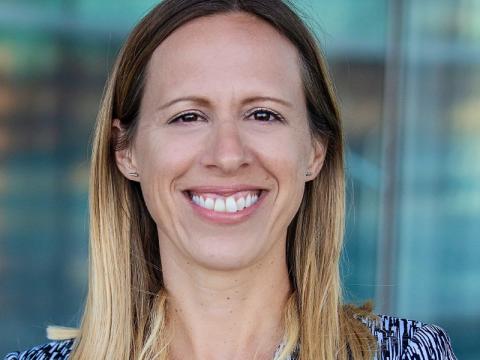
Outstanding Faculty Mentors

Adela Grando
Biomedical Informatics, College of Health Solutions
Biography
Maria Adela Grando, PhD applies computer science to medicine. She builds technologies to empower patients’ healthcare decisions and choices. Her work focuses on those usually excluded from research: Latinx individuals and patients with behavioral health conditions (including serious mental illnesses). Her work has been funded by ASU, Mayo Clinic, and NIH. Through her research, she provides Master and Ph.D. students with hands-on, community-based learning and training opportunities.
Mentoring Philosophy
As a first-generation student, a Latina woman in science, and a non-native English speaker who grew up in a developing country, I have a first-hand understanding of the academic challenges faced by college students. My goal is to be a role model for those who struggle to belong, provide the knowledge and tools that empower them to succeed, and mentor them to find their true passion and achieve their highest potential.
My mentoring style is based on five basic principles:
1. Integrate theory and real-world knowledge: My goal is to give mentees hands-on, real-life, and active learning opportunities to better prepare them for the workforce. I create mentoring experiences that require collaborating with multiple health providers and community partners, including Mayo Clinic, HonorHealth, Contexture (Arizona and Colorado Health Information Exchange), Copa Health, and Jewish Family and Children Services. My research projects allow mentees to conduct observations in clinical settings, recruit patients for studies, analyze electronic health record data, interact with clinicians, and develop and test interventions in clinical settings.
2. Teach strong work ethics: I train my mentees to be punctual, follow through on their commitments, be respectful and considerate to each other, behave professionally, and act with integrity and honesty. I do so by being a role model, setting up clear goals and expectations, monitoring weekly progress, providing honest feedback, rewarding positive work ethics (such as offering first co-authorship of papers), and recognizing dedication (such as organizing every semester a gathering with mentees to celebrate their academic successes).
3. Thrive through collaboration: I train my mentees in team science. Solving complex healthcare problems requires collaboration and leveraging the strengths and expertise of other professionals trained in different fields. For instance, my NIH-funded patient-controlled medical record-sharing research allows mentees to collaborate with national, state, and community experts in law, ethics, policy, healthcare, medicine, statistics, technology, and informatics. My goal is to train my mentees to lead research (29 out of 44 of my ASU journal and conference publications have students as first-author) that builds on the perspectives of large teams of experts.
4. Create just, equitable, diverse, and inclusive (JEDI) ecosystems: I make every possible effort to create inclusive and diverse mentoring environments. Most of my mentees are women (under-represented in STEM), individuals from minority groups, or non-native English speakers. As a leader of the Women in the American Medical Informatics Association (WIA) group, I work to create opportunities in informatics for female mentees. I advise my mentees to take advantage of the WIA resources we have designed to help women reach their professional goals and advance their careers. I encourage my mentees to participate in the annual WIA mentor-mentee event, where students get paired with academic or industry medical informatics leaders to discuss after-graduation professional goals.
5. Promote student success: I actively seek student awards, fellowships, and similar opportunities and encourage my mentees to apply. I advise them on the application process, review their applications, and write support letters. Since I started mentoring ASU students in 2013, 21 have received academic awards, including:
• four ASU Outstanding Graduate Student Awards;
• four ASU University Graduate Fellowships;
• three best paper or poster awards in local or national conferences;
• one nomination and one award as best Ph.D. informatics thesis in the United States from the American Medical Informatics Association;
• two best Arizona informatics student awards from the Arizona Chapter of Health Information and Management System Society;
• one student editorial board member for the leading international journal in informatics (JAMIA).